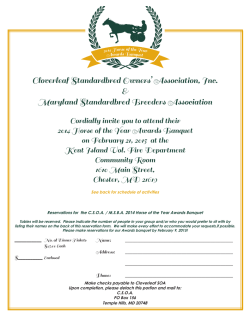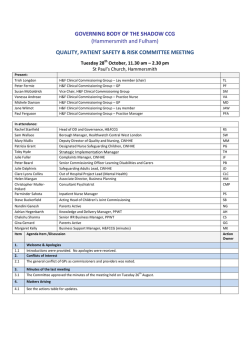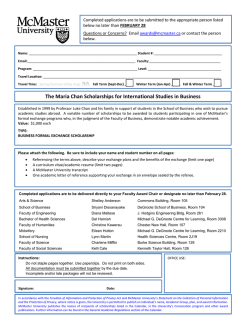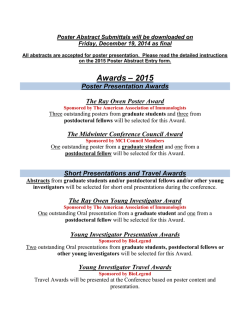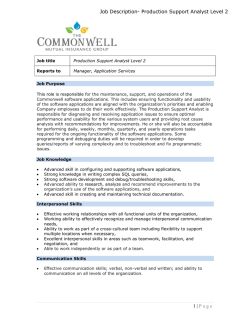
Review of the ESRC Doctoral Training Centres Network Executive
Review of the ESRC Doctoral Training Centres Network Executive summary Review undertaken by a panel chaired by Richard Bartholomew. Other Panel Members: Professor Richard Disney, Dr Joe Eyerman, Professor Jennifer Mason, Professor Steve Newstead, Professor Harry Torrance and Dr Rebekah Widdowfield The aims of the review were to assess the extent to which the Economic and Social Research Council (ESRC) Doctoral Training Centre (DTC) network, launched in 20112012, is meeting its core objectives. The full terms of reference are at Annex 1. The findings and recommendations will inform the design of the next round of network commissioning, and the call specification. The DTC network has only been in existence for a short time. It is too early to be able to draw very robust conclusions about its overall impact. Metrics need to be agreed to assess its longer term impact and the success of each DTC. DTCs are, however, making good progress in improving the quality and flexibility of training, fostering greater interdisciplinarity and building a strong sense of a national cohort of highly-skilled and motivated social science researchers. They are using the new flexibilities in funding in innovative ways. The leveraging in of co-funding, primarily from the DTC institutions themselves, has been a significant achievement, increasing significantly the total number of students benefiting from ESRC awards. There remain significant issues still to address. The Advanced Training network is not yet working as intended. More needs to be done to foster collaborations with non-academic partners and especially the private sector. The boundaries created between those universities who are part of the DTC network and those who are not, are currently too impermeable, limiting the wider diffusion of the many positive benefits of the initiative. Improving training and increasing flexibility The new DTC Network is equipping cohorts of social science postgraduates with excellent research and other key skills which will enable them to have an impact on the key economic and social questions. It is beginning to have a significant effect on developing interdisciplinary training and the sharing of different types of expertise. Student-led activities, especially the national first year and final year conferences, are helping to build a strong sense of being part of a national cohort of new social scientists. Advanced Training The Advanced Training network has so far failed to take off as a national and regional resource. There is much confusion about NCRM’s role as a clearing house for such courses and some dissatisfaction was expressed with its website. There are also unresolved questions of effective demand and supply which DTCs and non-DTCs should explore further. There needs to be more collaboration between DTCs and non-DTCs in each region to ensure that institutions are able to achieve a better match of demand and supply. 1 Virtual learning approaches should be more widely used across the DTC network than at present to improve access to Advanced Training. Collaborations with non-academic partners Steady progress has been made in developing collaborations with non-academic partners and there has been a substantial increase in these overall. However, the number of private sector collaborations has been falling. Overall 22 per cent of studentships involve nonacademic collaborations but only three per cent have collaborations with private sector organisations. ESRC and the DTC network should explore whether a specific and well branded programme to develop more collaborations would help to reverse this decline. International partnerships It is too early to comprehensively assess the overall success and impact of the new International PhD partnering pilot. DTCs have developed partnerships with 64 universities and research institutes in 27 countries. The scheme has made good progress in developing reciprocal international institutional collaborations and supporting the development of an international cohort of early career researchers. National Benchmarks and Priority Areas The introduction of DTCs and the new flexibilities in funding have enabled a significant increase in the total number of postgraduates benefiting from ESRC awards – a 19 per cent increase in the last three years. This is an important achievement. Most disciplines have shared in this increase. However, the creation of the DTC Network and the identification of national benchmarks has had no effect on the shortage disciplines of Education, Social Anthropology or Social Work. The position for the key priority areas of Economics, Advanced Quantitative Methods, Management and Business Studies, Language Based Area Studies and Interdisciplinary Studies is much more encouraging. Tackling the shortfall in numbers of ESRC-funded places for the disciplines experiencing decline or nil growth in awards requires a variety of strategies. We welcome the fact that ESRC will soon be updating its demographic review to explore the issue. We favour retaining steers on shortage disciplines as well as national benchmarks but as much, or more, is likely to be achieved through offering greater flexibility in rules and requirements around studentships and ensuring courses are better adapted to the needs of ‘non-standard’ students and mid-career entrants who have competing family pressures. Types of award: 1+3 and +3 models There is concern about the implications for widening access and participation of the fall in the number and proportion of 1+3 awards. The proportion of 1+3 awards has fallen to less than a third and +3s have increased. We recommend that the Training and Skills Committee should review how effective the current monitoring strategy is compared with a more directive approach using explicit targets and/or ring-fenced funding allocations for 1+3 awards. The 1+3 awards should be restored to the two-fifths level seen in 2011-12, with the aim of moving back to the 50 per cent level seen in earlier years. 2 Awarding studentships Different DTCs have very different approaches to allocating studentships. Some have a completely open competition with no pre-determined quotas. Others hold an open competition for a proportion of the studentships but have pre-set minimum quotas for individual pathways and/or member institutions. Both approaches have their merits and their advocates. We recommend that the right balance between open competitions and the use of quotas should be for the DTCs themselves to decide. The key consideration should always be recognising and rewarding excellence. Common deadlines for applications and decisions on studentships There is a virtually unanimous view that there should be a uniform closing date for applications and decision dates for studentship awards across the DTC network. We fully support this view and recommend that the DTC Directors, in consultation with the ESRC, should agree a common deadline. Structures and funding The concentration of ESRC’s postgraduate research funding into 21 DTCs was an understandable response to developing excellence and achieving the necessary critical mass in the face of significant overall reductions in the Council’s budget. Strong representations have, however, been made that the new structure ignores or undervalues the smaller ‘pockets of excellence’ which are to be found in institutions outside the DTC network. Others dispute this argument and feel that is over-stated. Whatever the true extent and quality of such centres of excellence, where they exist, especially where indicated in the results of the Research Excellence Framework (REF), we recommend that they should be included in future DTC commissioning processes as part of consortia bids. DTCs should be encouraged to collaborate on delivering pathways provided jointly by departments or units both inside and outside the DTC where high quality training and expertise on a specific topic is found beyond the DTC itself. DTCs and Centres for Doctoral Training Centres for Doctoral Training (CDTs) offer a feasible approach for addressing interdisciplinary issues both within and across councils but introducing this model now would inevitably have a significant effect on the funding available for existing DTCs. We do not believe it would be right to try to introduce CDTs in addition to the existing DTCs unless additional funding becomes available, but ESRC should explore co-funding options with the other research councils. Greater interdisciplinarity is also achievable within the existing DTC approach. Consortia or single institution DTCs? It is too early to conclude that consortia DTCs as such are necessarily the optimal model, though some single institution DTCs may be too small to provide the critical mass of training and opportunities required or to create a strong student cohort effect. We do not favour a move to exclusively consortia DTCs in the next round of commissioning – the key question should be whether a proposed DTC will be able to provide the range and quality of training experiences required, not its organisational composition. 3 Recommissioning For reasons of fairness and to ensure continuing high quality, the commissioning process for the next round must be fully open to all institutions and fully transparent. In preparation for the next commissioning round we recommend that ESRC should hold workshops for potential bidders to give them a greater awareness of what is involved in setting up and running a DTC, especially a consortium, and some of the lessons learnt from the first round. A key ingredient for the success of a DTC is having strong, strategic and properly resourced leadership. Bidders in the recommissioning round should be required to provide clear and costed proposals on how the DTC will be managed, especially the provision made for a Director post. The adequacy of these proposals should have a significant bearing on whether an application is approved. Networking We recommend that wider networking between DTCs both regionally and nationally should be fostered in order to share best practice and find solutions to emerging issues. ESRC Recognition The ending of the process of ESRC recognition for social science departments reaching a high standard of quality is much regretted by those institutions which have no ESRC studentships. It has been argued that this ‘kite-mark’ helped them attract other types of research funding as well as high quality students. However, given the constraints on ESRC’s budget, we accept that providing a universal recognition exercise can no longer be a priority. Reducing bureaucracy We recommend that ESRC, in consultation with DTC Directors and administrators, undertakes a light touch review of its own administrative processes to ensure that it really is minimising the number of instances where DTCs have to seek ESRC approval or endorsement for decisions which are best made by DTCs themselves. Evaluating impact and success We recommend that an explicit set of output and outcome criteria is agreed by ESRC with the DTC Network to ensure that all parties, including institutions which are not yet part of a DTC, are clear on how success is being assessed, using quantifiable measures wherever possible. These should be put in place before the next commissioning round. 4
© Copyright 2026
